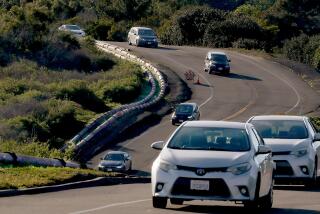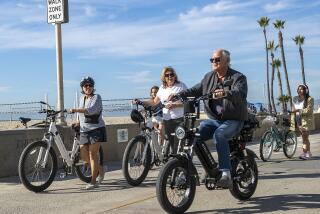Bike ban comes as shock in a sports-loving state
- Share via
At first glance, this quaint old mining town looks like many others that dot the hills and canyons of this mountainous state.
There are old brick storefronts, Victorian homes on the hillsides and winding, narrow lanes corkscrewing up to the sky. But instead of Lycra-clad fun-seekers and shabby-chic shops, Black Hawk is filled with tour buses and casinos.
And this summer, the town took an unprecedented step for a mountain community here -- it banned bicycles from its main streets.
It’s the Colorado equivalent of outlawing motherhood and apple pie. The sports-crazy state’s influential cycling organizations are horrified and vow to challenge the city ordinance both in court and in the Legislature. But Black Hawk, population less than 100, isn’t backing down.
“It’s an important issue to us, and we believe that Black Hawk should have the right to control its streets,” said City Manager Mike Copp.
The problem: The roads were built for horses and buggies more than 100 years ago. Now they hold an armada of tour buses on the weekends. The Legislature, at the prodding of cycling groups, passed a law in 2009 requiring that motorists give bikes three feet of space if passing. That would force traffic in parts of Black Hawk to veer into the wrong side of the road, Copp said.
Or, countered Dan Grunig, executive director of Bicycle Colorado, motorists could do what they are required to do on other narrow thoroughfares -- treat bicycles as any other type of vehicle and wait behind them.
“We’re very confident we’re going to win and show that they’ve overstepped what a local government can do,” Grunig said.
Part of the reason for the furor is that this speck of a town sits in the middle of one of the main bike touring routes through the Rockies.
The town’s twisting main artery, Gregory Street, links I-70 -- the central east-west route through Colorado -- with the scenic Peak-to-Peak Highway, which meanders north through aspen glades and glacial peaks before ending outside Rocky Mountain National Park, where riders can pick up roads back to Denver.
“It’s a pretty wonderful street to bike on,” Grunig said of Gregory Street. “A lot of communities would kill to have a street like that.”
Many Colorado cities outlaw bikes on specific streets, such as pedestrian shopping malls. But those often have other possible routes. The only alternative route in Black Hawk is to either ride a gravel road or a 46-mile paved detour over the Continental Divide.
One afternoon last week, Copp stood outside City Hall -- a small building dwarfed by neighboring Bullwhacker’s casino -- and gestured up and down Gregory Street. Even on a weekday, tour buses clogged the road. He pointed out a century-old light pole that rose from the shoulder of the street, another obstacle to sharing the road with bikes.
“You have all these tour buses, delivery trucks,” Copp said. “Where do you want to put a bike?”
Black Hawk’s Board of Aldermen approved the bike ban last year and it took effect in January, but police didn’t begin to hand out tickets until June, when cyclists started their seasonal rides through town.
Jamie Webb was the first rider to get cited. She didn’t notice the signs along Gregory with the image of a bicycle and a red slash through it, and figured she was being pulled over for speeding. Instead, Webb got a $68 ticket.
“I just don’t see why they would do a thing like this,” Webb said. “It’s such a wonderful route.”
Copp said the move was partly at the urging of the casinos in town, but stressed that the ban is a safety issue and that the town is not opposed to outdoor recreation. This is, after all, Colorado.
In fact, Copp said, Black Hawk is looking into buying land in the nearby hills to create parks, complete with mountain bike trails.
nicholas.riccardi@ latimes.com
More to Read
Sign up for Essential California
The most important California stories and recommendations in your inbox every morning.
You may occasionally receive promotional content from the Los Angeles Times.













